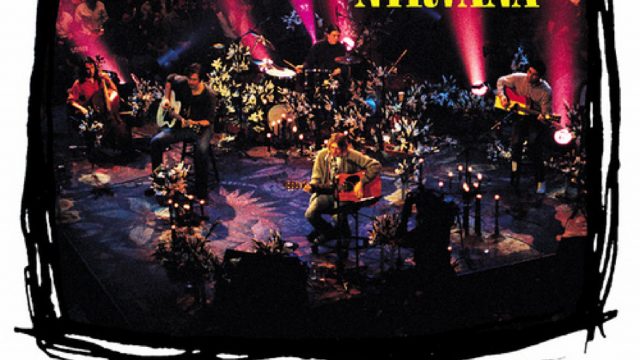I was once talking with a friend about Nirvana, and after a few minutes of discussion, he said matter-of-factly, “I like Nirvana, but they’re one of those bands that may have done more harm than good long-term.” A little prodding gave his statement a little clarity: Nirvana, as he saw it, was the most popular grunge band, and grunge begat bubble-grunge, which begat Creed, which begat Nickleback, among others of rock’s most heinous last gasps on mainstream radio.
It’s an understandable statement, although I’d be more open to giving the “more harm” label to Pearl Jam, given the closer stylistic heritage between that group (which I still love) and, you know, Nickleback. As much as grunge is/was heralded as the killers of hair metal excess and the saviors of rock and roll (if I had a dollar for every time a short-lived, artistically questionable movement was given that label… well, I could probably buy one of those Strokes albums I never got around to getting), it’s pretty universally acknowledged that outside of a few core bands, the whole grunge endeavor didn’t have the artistic legs to get it out of the early ’90s before succumbing to the same dumb posturing that people complained of regarding hair metal.
However, MTV Unplugged in New York is probably the best refutation of my buddy’s idea. Though I suppose the acoustic covers that form the band’s setlist here could be blamed for another sort of musical scourge (between this and Jeff Buckley’s “Hallelujah,” the acoustic covers of serious songs genre was born wholly formed), the “unplugged” nature of the recording set the band so far away from the grunge aesthetic that the songs are basically raw melody. Jeff Tweedy says that when you strip enough production away, pretty much everything becomes a folk song, and that bears out here, becoming the most obvious argument that Nirvana was, before grunge, before angst, a songwriting band of the highest order. Plus, they cheat on the “unplugged”–those are electric guitars riffing on “The Man Who Sold the World”!
Not only that, but speaking of “The Man Who Sold the World,” MTV Unplugged is, alongside maybe Incesticide, the grandest showcase of Nirvana as not just an arbiter of cool but also of the obscure. Appearing on MTV–and not just MTV but their Unplugged series, which, by the time of Nirvana’s appearance in 1993, had already been home to performances by Mariah Carey, Paul McCartney, and (most infamously) Eric Clapton–could have come across as the heights of commercial cynicism and zeitgeist abuse. But then look at the setlist. It’s one-fifth Meat Puppets songs, for goodness sakes, and if you knew who the Meat Puppets were before Nirvana started championing them, you get a prize. In fact, nearly half the album is comprised of covers, and not necessarily crowd-pleasing ones, either: in addition to the aforementioned Meat Puppets, there are deep cuts from blues legend Lead Belly and longtime Nirvana favorites The Vaselines, and then we get some David Bowie, definitely the closest to a mainstream choice, but from his weird pre-Hunk Dory metal phase (Cobain even has to clarify, “That was David Bowie”). And even the Nirvana songs half of the release shies away from cashing in on the band’s fame; the only “hit” here is “Come As You Are,” with the rest being either Nevermind back-halfers or non-single In Utero tracks (and one Bleach moment, the opening “About a Girl”). This is not Nirvana putting on a rock show. This is Nirvana pleading with an audience to look beyond their radio dials, to deep-dive at a record store. As much as Nirvana was a radio friendly unit shifter for the grunge movement, the band’s most formative cultural role was its hand in legitimizing the weird and the overlooked. Nirvana gets a lot of press for the way it inspired teenage angst, etc., but there’s also an entire generation whose musical tastes were shaped by Nirvana’s, tastes I’d be willing to bet skewed toward the shaggy, strange mid-’90s indie scene more often than toward bubble-grunge. From the beginning, Nirvana was an ambassador of the underground, and the MTV Unplugged show this crossover at its most ambitious.
But more than anything else, there’s “Where Did You Sleep Last Night.” Nothing can swallow “Where Did You Sleep Last Night”–not fandom, not MTV, not Nickleback, not Nirvana’s own legacy. It’s the biggest Nirvana moment in the set, and it’s not even a Nirvana song; it’s among the most electrifying live performances ever recorded; it’s perfect. I defy anyone to listen to that song–the thundering doom of the guitar chords, the slinking unease of the cello, the cracks of Cobain’s ragged vocals–and tell me that it’s not bleeding proof to this day of Nirvana as one of the most vital bands of its generation, if not all time. Listen to that performance and tell me that Nirvana did more harm than good for music. Listen to it and tell me you don’t come face to face with the musical sublime.
It’s really good, y’all. In Utero may be the culmination of Nirvana’s studio output, but MTV Unplugged is the culmination of Nirvana as a cultural force, the distillation of the impulses that made the band a legend, as if In Utero is the final shout and Unplugged is the insistent echo that reveals the beauty of the voice’s timbre. A premature end, without a doubt. But a perfect one within the tragedy of that cutting short.

